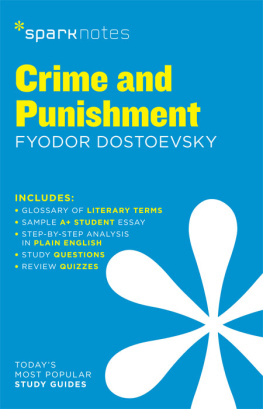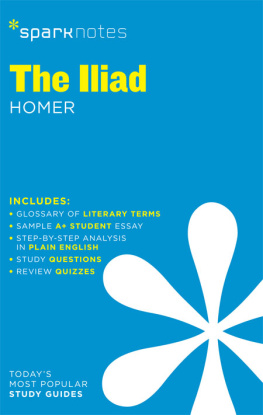Titus Andronicus
William Shakespeare
2003, 2007 by Spark Publishing
This Spark Publishing edition 2014 by SparkNotes LLC, an Affiliate of Barnes & Noble
All rights reserved. No part of this publication may be reproduced, stored in a retrieval system, or transmitted in any form or by any means (including electronic, mechanical, photocopying, recording, or otherwise) without prior written permission from the publisher.
Sparknotes is a registered trademark of SparkNotes LLC
Spark Publishing
A Division of Barnes & Noble
120 Fifth Avenue
New York, NY 10011
www.sparknotes.com /
ISBN-13: 978-1-4114-7796-4
Please submit changes or report errors to www.sparknotes.com/errors.
10 9 8 7 6 5 4 3 2 1
Context
Likely the most influential writer in all of English literature and certainly the most important playwright of the English Renaissance, William Shakespeare was born in 1564 in the town of Stratford-upon-Avon in Warwickshire, England. The son of a successful middle-class glove-maker, Shakespeare attended grammar school, but his formal education proceeded no further. In 1582, he married an older woman, Anne Hathaway, and had three children with her. Around 1590 he left his family behind and traveled to London to work as an actor and playwright. Public and critical success quickly followed, and Shakespeare eventually became the most popular playwright in England and part owner of the Globe Theater. His career bridged the reigns of Elizabeth I (ruled 1558-1603) and James I (ruled 1603-1625); he was a favorite of both monarchs. Indeed, James granted Shakespeare's company the greatest possible compliment by endowing them with the status of king's players. Wealthy and renowned, Shakespeare retired to Stratford, and died in 1616 at the age of fifty-two. At the time of Shakespeare's death, such luminaries as Ben Jonson hailed him as the apogee of Renaissance theatre.
Shakespeare's works were collected and printed in various editions in the century following his death, and by the early eighteenth century his reputation as the greatest poet ever to write in English was well established. The unprecedented admiration garnered by his works led to a fierce curiosity about Shakespeare's life; but the paucity of surviving biographical information has left many details of Shakespeare's personal history shrouded in mystery. Some people have concluded from this fact that Shakespeare's plays in reality were written by someone else--Francis Bacon and the Earl of Oxford are the two most popular candidates--but the evidence for this claim is overwhelmingly circumstantial, and the theory is not taken seriously by many scholars.
In the absence of definitive proof to the contrary, Shakespeare must be viewed as the author of the 37 plays and 154 sonnets that bear his name. The legacy of this body of work is immense. A number of Shakespeare's plays seem to have transcended even the category of brilliance, becoming so influential as to affect profoundly the course of Western literature and culture ever after.
In 1687, a full hundred years after the first performance of Titus Andronicus, Edward Ravenscroft adapted the play for a different audience. In an introduction to his more refined version, he wrote, "I have been told by some anciently conversant with the stage, that it was not originally his [Shakespeare's], but brought by a private author to be acted, and he only gave some Master-touches to one or two of the principal parts of characters; this I am apt to believe, because 'tis the most incorrect and indigested piece in all his works; it seems rather a heap of Rubbish than a structure."
More interesting than the fact that Ravenscroft thought the play was bad enough to merit "Rubbish" with a capital "r," is the determination of the author to rescue the good name of Shakespeare. This captures the essence of the history of the play Titus Andronicus, in which admirers of Shakespeare venture to deny his authorship of such a bad, probably his worst, play. This debate has carried over into this century. If scholars acknowledge the hand of the great master in this work at all, they usually point to his youth as an excuse for the assumed poverty of its quality (Shakespeare would have been 26 at the time, with Titus Andronicus marking his first attempt at writing tragedy). This controversy rages despite the fact that Meres publicly named Shakespeare as the play's author in Palladis Tamia (1598), and that the play is included in the First Folio.
Perhaps one of the reasons Titus Andronicus has sparked such contention rests on its resistance to easy categorization. Portraying events supposedly derived from the history of the late Roman empire, but which are entirely fictitious, the play clings barely to the genre of both history play and Roman play. It also bears some elements of a tragedy, but can make little claim of offering its audience catharsis. The best description of the play would be that of a revenge tragedy, a genre defined by a hero who doggedly pursues vengeance and perishes at his moment of success. On many counts, Titus Andronicus follows the conventions of the Elizabethan revenge play; yet in its massive excess the play seems less an imitation of the Elizabethan revenge drama than a deliberate parody of that form.
Whether Rubbish or revenge, the play met with great public support upon opening. Books of the Elizabethan era testify to a public audience with particularly bloody tastes, and Titus Andronicus was received with great applause, remaining a favorite for over a decade. Though certainly not one of Shakespeare's top tier plays, the poetry of Titus Andronicus nevertheless displays specifically Shakespearean traits that needed only to mature before forming the foundation of his many masterpieces.
Summary
By S. Clarke Hulse's count, Titus Andronicus is a play with "14 killings, 9 of them on stage, 6 severed members, 1 rape (or 2 or 3, depending on how you count), 1 live burial, 1 case of insanity and 1 of cannibalism--an average of 5.2 atrocities per act, or one for every 97 lines." Reviewer Mike Gene Wallace adds, "This is a great play. We're talking fourteen dead bodies, kung-fu, sword-fu, spear-fu, dagger-fu, arrow-fu, pie-fu, animal screams on the soundtrack, heads roll, hands roll, tongues roll, nine and a half quarts of blood, and a record-breaking 94 on the vomit meter." Really, there's not much more to say; that is the essence of the play. Titus Andronicus is a non-stop potboiler catalog of abominations (with the poetry itself counted as a crime by many critics).
Titus Andronicus, Roman general, returns from ten years of war with only four out of twenty-five sons left. He has captured Tamora, Queen of the Goths, her three sons, and Aaron the Moor. In obedience to Roman rituals, he sacrifices her eldest son to his own dead sons, which earns him Tamora's unending hatred and her promise of revenge.
Tamora is made empress by the new emperor Saturninus. To get back at Titus, she schemes with her lover Aaron to have Titus's two sons framed for the murder of Bassianus, the emperor's brother. Titus's sons are beheaded. Unappeased, she urges her sons Chiron and Demetrius to rape Titus's daughter Lavinia, after which they cut off her hands and tongue so she cannot give their crime away. Finally, even Titus's last surviving son Lucius is banished from Rome; he subsequently seeks alliance with the enemy Goths in order to attack Rome. Each new misfortune hits the aged, tired Titus with heavier impact. Eventually, he begins to act oddly and everyone assumes that he is crazy.


















